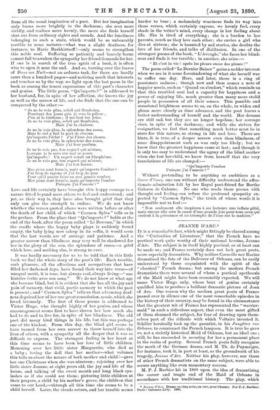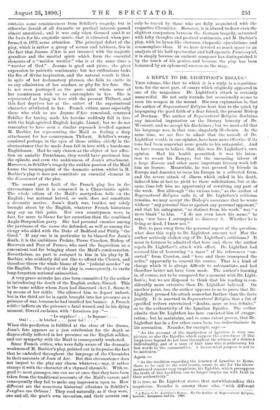JEANNE D'ARC.*
IT is a remarkable fact, which might fittingly be classed among the "Curiosities of Literature," that the French have no poetical work quite worthy of their national heroine, Jeanne d'Arc. The subject is in itself highly poetical, or at least can be made so ; and France certainly does not lack great poets, more especially dramatists. Why neither Corneille nor Racine dramatised the fate of the Deliverer of Orleans, can be easily understood by those acquainted with the spirit of the "classical" French drama; but among the modern French dramatists there were several of whom a poetical apotheosis of the Maid might have been reasonably expected. We will name Victor Hugo only, whose bent of genius certainly qualified him to produce a brilliant dramatic picture of Joan of Arc. One reason why the modern great poets of France passed over in silence one of the most remarkable episodes in the history of their country, may be found in the circumstance that the greatest wit of France has represented the " warrior- maid " in such a ridiculous aspect, that even the most gifted of them shunned the subject, for fear of drawing upon them- selves part of the ridicule with which Voltaire invested it. Schiller heroically took up the gauntlet, in his fungfrau von. Orleans, to counteract the French lampoon. It is true he gave us, not a strictly historical Maid of Orleans, but an ideal one ; still, he has succeeded in securing for her a permanent place in the realm of poetry. Several French poets fully recognise the merit of the German drama, and M. Th. de Paymaigre, for instance, took it, in part at least, as the groundwork of his tragedy, Jeanne d'Are. Neither his play, however, nor those of other French dramatists on the same subject, were able to secure anything like even momentary success.
M. P. J. Barbier hit in 1869 upon the idea of dramatising the career and tragic end of the Maid of Orleans in accordance with her traditional history. The play, which
Jeanne &Arc. Drame en einq aetes, en vers, avec Cboanrs. Par P. J. Barbier. Paris : Calmann Levy. 1890.
contains some reminiscences from Schiller's tragedy, but is otherwise devoid of all dramatic or poetical interest, passed almost unnoticed ; and it was only when Gounod used it as the basis for his exquisite music, that it attracted, when per- formed in 1873, some attention. The principal defect of the play, which is rather a group of scenes and tableaux, lies in the fact that Jeanne d'Are is not invested with the majestic grandeur and the martial spirit which form the essential elements of a "maiden warrior" who is at the same time a warrior of God." Jeanne is good and pious ; she gives expression to patriotic sentiments ; but her enthusiasm lacks the fire of divine inspiration, and the natural result is that, in spite of her declamatory phrases, she fails to excite in us any admiration of her conduct, or pity for her fate. She is not even portrayed as the pure saint whom some of her countrymen wish us to contemplate in her. She is represented as being in love with the peasant Thibaut, and this fact deprives her at the outset of the supernatural character attributed to her. French critics, more especially those who wish to see Jeanne d'Arc canonised, censured Schiller for having made his heroine suddenly fall in love with the high-spirited English knight, Lionel ; but we do not remember to have seen a similar reproach levelled against M. Barbier for representing the Maid as feeling a deep attachment for her countryman, Thibaut. Schiller's wrong consisted perhaps, in the eyes of those critics, chiefly in the circumstance that he made Joan fall in love with a handsome Englishman. Had he only chosen as the object of her affec- tion an amiable Frenchman, they would have pardoned him the episode, and even the suddenness, of Joan's attachment. Moreover, in Schiller's tragedy the sudden passion of the Maid forms the turning-point of the dramatic action, whilst in M. Barbier's play it does not constitute an essential element in the denouement of the plot.
The second great fault of the French play lies in the circumstance that it is composed in a Chauvinistic spirit. The whole odium of the Maid's martyrdom falls on the English ; but national hatred, as such, does not constitute a dramatic motive. Joan's death was, besides, not solely brought about by the English, whatever French historians may say on this point. Her own countrymen were, in fact, far more to blame for her execution than the combined Anglo-Burgundian party. She had personal enemies among the partisans of the cause she defended, as well as among the clergy who sided with the Duke of Bedford and Philip "the Good." If any one is in particular to be blamed for Joan's death, it is the ambitious Prelate, Pierre Cauchon, Bishop of Beauvais and Peer of France, who used the Inquisition as a convenient tool for bringing about the Maid's condemnation. Nevertheless, no part is assigned to him in his play by M. Barbier, who evidently did not like to offend the Church, and therefore threw the whole blame of the "judicial murder" on the English. The object of the play is, consequently, to excite long-forgotten national animosities.
A very grave mistake has also been committed by the author in introducing the death of the English archer, Siward. This is the same soldier whom Joan had disarmed (Act I., Scene 8) by means of her sickle. She allowed him to depart unhurt, but in the third aot he is again brought into her presence as a prisoner of war, because he had insulted her banner. A French soldier inflicts on the prisoner a fatal wound, and in his dying moment, Siward exclaims, with ferocious joy :"— " Le supplice ! . . . la flamme ! . . . Oui ! . . . le bAcher . . . pour toi . . "
When this prediction is fulfilled at the close of the drama, Joan's fate appears as a just retribution for the death so disgracefully inflicted in her presence on the English soldier, and our sympathy with the Maid is consequently weakened.
Some French critics, who were fully aware of the dramatic weakness of M. Barbier's play, pointed out in its praise the fact that he embodied throughout the language of the Chronicles in their accounts of Joan of Arc. But this circumstance does not impart to the play any charm whatever,—nay, it rather stamps it with the character of a rhymed chronicle. With re- gard to most passages, one can see at once that they have been taken from the traditional accounts of the Maid's career, and consequently they fail to make any impression upon us. How different are the numerous historical allusions in Schiller's Jungfrau von Orleans ! They read naturally, as if they were, one and all, the poet's Own invention, and their sources can only be traced by those who are fully acquainted with the respective Chronicles. However, it is absurd to draw even the slightest comparison between the German tragedy, saturated with lofty thoughts and poetical sentiments, and M. Barbier's play, with its hymn-like choruses, rhapsodic ejaculations, and commonplace ideas. If we have devoted so much space to an analysis of his half-spectacular and half-operatic Passionspiel, it is simply because an eminent composer has distinguished it by the touch of his genius, and because the play has been honoured by an ephemeral success on the stage.



































 Previous page
Previous page